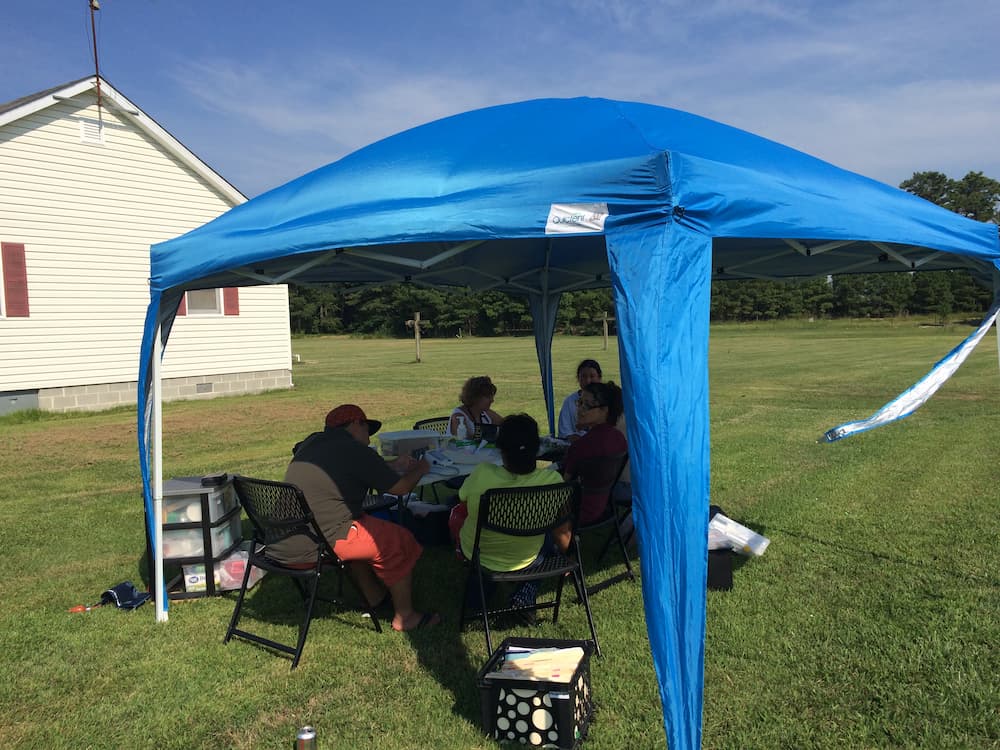When the Personal Is Political

In Landscapes of Care, College of Arts and Sciences Anthropology Professor Thurka Sangaramoorthy’s new book, Junior, an immigrant from Haiti, opens up about how he joined his family on the Eastern Shore of Maryland. Just 20 years old at the time, he intends to study, but must quit community college and work at a poultry processing plant to help his family. Sangaramoorthy writes about the daily indignities and health risks Junior experiences. Junior eventually finds a way to quit. Junior’s story is not unique and is one of many Sangaramoorthy includes as she documents the struggles of immigrants from Latin America and the Caribbean who seek to make a life in rural Maryland.
Sangaramoorthy, a global health and migration scholar and member of AU’s Antiracist Research and Policy Center and the Immigration Lab, spent nearly a decade in Eastern Shore communities, interviewing immigrants working in the agriculture, poultry and seafood industries. In many parts of rural America, immigrant populations have grown by more than 1,000 percent, Sangaramoorthy and other researchers find. At the same time, getting health care in rural America is challenging. The Affordable Care Act of 2010, a landmark law that widened access to the uninsured, has its limitations. And rural hospitals, including those on the Eastern Shore, are shuttering. In her book, Sangaramoorthy captures how care gets “unevenly distributed through hierarches of race, language and national origin,” and how people find ways to care for one another and receive care amid circumstances shaped by globalization, a lack of resources and the demand for cheap labor.
You put a face to many of your research subjects by illustrating their plights as people struggling with the effects of racism and health inequities. Why was this important?
As an anthropologist and ethnographer, I spend a lot of time listening, conversing, observing and participating in the daily life of people with whom I work. Stories of personal experience bring research to life by putting a human face on otherwise detached research findings. Stories make complex issues more accessible to a variety of people, well beyond academia. They give power to the voices and perspectives of those who experience the challenges we study. Just as the stories in the book convey experiences of deep injustices, they also inspire, challenging the way we think to provide a vision for a better future.
 Patients receive care at a mobile clinic. Photo by Thurka Sangaramoorthy
Patients receive care at a mobile clinic. Photo by Thurka Sangaramoorthy
Health care has become precarious for many rural Americans, and the book shows great effects on migrants and immigrants. What are some solutions?
Market-driven changes in the 1990s toward managed care principles and an emphasis on corporate and business philosophies have significantly affected health care delivery everywhere. For example, since 2005, 181 hospitals have closed, and the rate of rural hospital closures has continued to increase in the past decade, research shows.
Policymakers designed the ACA to provide much-needed relief to rural health systems. A primary goal was to reduce the number of uninsured Americans, which stood at approximately 50 million at the time, through the expansion of both private insurance and government-funded Medicaid. But many states with large rural populations did not expand Medicaid, though this would have offered them funding to care for poor, uninsured residents, most of whom are Native, Black and Latinx. Under the ACA, health centers and their capacity for managing patients have grown. Yet many people struggle to afford public insurance because of restrictive immigration and health policies.
Unless there are transformative policy changes that offer universal health care and move away from the corporatization of health more broadly, the issue of lack of access for rural residents and immigrants will continue.
What immigration policies, perhaps working in tandem with health policies, could help?
Immigration and health policies are incredibly related. The ACA, for instance, offers new options for health coverage for naturalized citizens and lawfully present immigrants. Yet many remain ineligible for these coverage options because of immigration restrictions. Employers can choose to offer health care benefits for migrant workers. Migrant or temporary guest workers can purchase ACA-compliant health insurance within 60 days of their arrival or other temporary, short-term medical insurance. However, this can be expensive for people making so little. Many of the people I worked with did not have insurance through their employers; their only option was to pay out of pocket.
How could companies that employ migrants and immigrants improve health conditions for workers?
Employers and policy makers can indeed make many choices to prioritize workers’ health and well-being such as better pay, safer working conditions and time off to seek care.
However, it’s not that easy to insist on such changes. Occupational injury and harm must be seen more broadly. We must account for complex social, political and economic interactions that contribute to occupational health inequity for these workers. We must understand that these workplace injuries are necessary for capital accumulation and for our own desire to have cheaper goods. States and corporations actively authorize racialized geographies of risk and enact racial violence through injury, illness and premature death, so they will be less likely to make substantial changes to improve working conditions.
